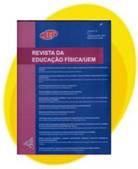<b>Malnutrition, metabolic syndrome and physical exercise in experimental models using rats</b> - doi: 10.4025/reveducfis.v21i4.6347
Keywords:
Malnutrition. Metabolic syndrome, Risk factors, Physical fitness
Abstract
There is evidence that intrauterine malnutrition may make fetal tissues more vulnerable to chronic diseases. Also, the excessive fructose intake has been associated to the development of metabolic syndrome. Animal models are useful for the study of these questions, since studies in human beings present limitations. Therefore, this work aimed to review topics in malnutrition, metabolic syndrome, physical exercise and aerobic capacity in animal models. The articles analyzed in this review allowed us to conclude that the majority of the studies show the influence of malnutrition on resting variables, after birth or weaning. There are few studies monitoring the animals until adulthood. Also, the nutritional recovery is often performed with balanced diets. Due to the increasingly fructose presence in food, fructose rich diets have been used to induce metabolic syndrome in animal models. Therefore, interactions between malnutrition, nutritional recovery, fructose rich diets, physical exercise and aerobic capacity constitute an interesting field of investigation.Downloads
Download data is not yet available.
Metrics
Metrics Loading ...
Published
2010-12-05
How to Cite
1.
Cambri LT, Dalia RA, Mello MAR de. <b>Malnutrition, metabolic syndrome and physical exercise in experimental models using rats</b> - doi: 10.4025/reveducfis.v21i4.6347. JPhysEduc (Maringá) [Internet]. 2010Dec.5 [cited 2026Jan.10];21(4):709-20. Available from: https://periodicos.uem.br/ojs/index.php/RevEducFis/article/view/6347
Issue
Section
Review Articles
• Authors retain the copyright and full publishing rights without restrictions.

This work is licensed under a Creative Commons Attribution 4.0 International License.









_1502.jpg)











